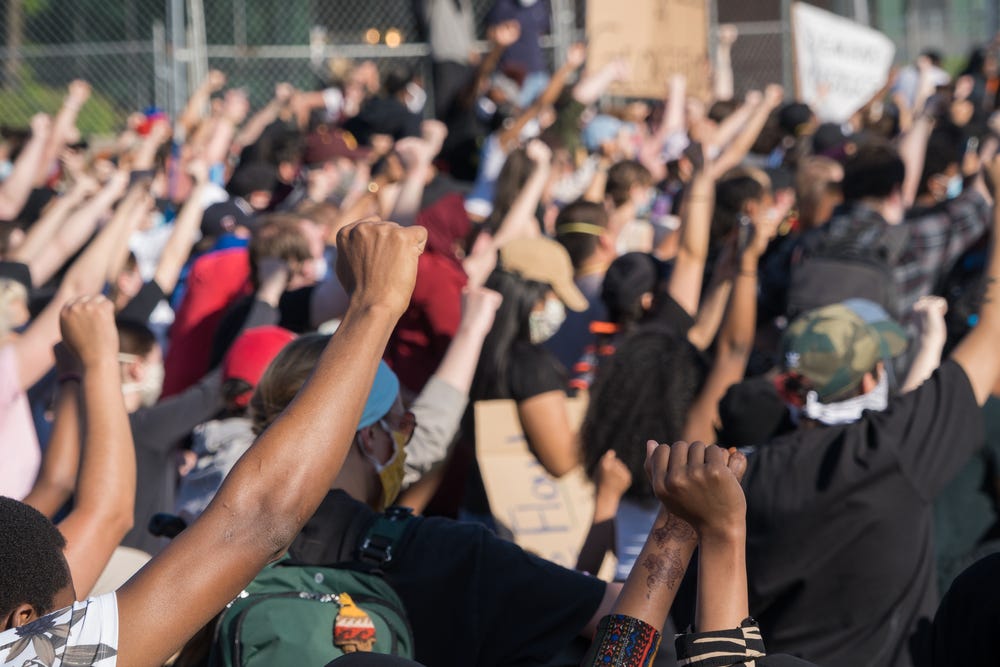E-Pluribus | August 9, 2022
One man's bleak vision of America's future; protest has its place, but it's not the end goal; and sometimes patriotism is just patriotism.
A round-up of the latest and best writing and musings on the rise of illiberalism in the public discourse:
Guy Denton: ‘All the Green Shoots Are Dead’
Jonathan Haidt’s jeremiad over America and social media in The Atlantic earlier this year caused quite a stir. Recently, Guy Denton interviewed Haidt for The Dispatch, and found his outlook for the country no sunnier in person. Haidt rails against the ends-justify-the-means thinking dominates the politics of both the left and right today, suggesting that the “ends” that result won’t be the “ends” anyone wanted anyway.
As the real world has become increasingly inextricable from the virtual landscape, illiberalism has grown. For progressives, it manifests in cancel culture, a hostility to free speech, and an overriding concern with emotional safety. Haidt recalls that in his early years as an academic, there was no hint of this in higher education “because the students were Gen X. They were partying, hooking up, smoking pot. They were doing things kids do. You can’t have cancel culture without social media or technology. A lot of the ideas had been around since the ‘90s—words are violence, things like that. But they didn't leave those departments until the walls fell. And it took social media to dissolve the walls between everything.” Haidt believes 2014 was the year in which Twitter enveloped American life, eliminating the distinction between public and private and fueling a censorious woke culture on the left. But the right has equally succumbed to its baleful influence, embracing conspiratorial thinking and the vulgar aspects of Trumpism. Tribalism rules across partisan lines.
“I think tribalism is very natural and easy,” Haidt says as our conversation turns to the Republican Party’s embrace of the Stop the Steal movement and the Great Replacement Theory. “Us versus them will trump any moral foundation. If it’s an existential struggle between us and the bad guys, then the ends justify the means. And if our side has to break a few eggs, break a few laws, break a few rules then that’s okay—look what they’re doing. People will gladly throw away any specific moral principles in service of defeating the enemy.” Until recently, the great success of modern liberal democracy was that it largely kept this primal impulse at bay. “We used to see elections as a game that we trust, and if our side loses, well, we’d better work harder to win next time,” Haidt continues. “And of all the horrible things Trump did, I think literally committing to winning an election by any means before the election is among the most shameful things that anyone’s ever done in American history. And the Republican Party, to its eternal shame, backed him up and protected him.”
Read the whole thing.
Matt Johnson: The Limits of Radical Protest
In these times when a fighting-fire-with-fire ethic is attracting so many fans, Matt Johnson at Quillette says a look back at a veteran of the civil rights era is in order. While “protest” is an important part of initiating change, it cannot become an end unto itself. Without realistic goals and a willingness to compromise, radical protesting takes on a life of its own and simply perpetuates conflict.
[Bayard] Rustin didn’t have much patience for protesters who were unwilling to compromise on their cherished beliefs to get things accomplished. He observed that “there is a strong moralistic strain in the civil rights movement which would remind us that power corrupts, forgetting that the absence of power also corrupts.” When social movements succeed in gaining power, they’re often forced to forge coalitions, strike deals, and appeal to larger constituencies. When they lack power, they’re more vulnerable to the corruptions of groupthink, ideological zealotry, and utopian thinking.
This brings us to Rustin’s second warning: if you seek transformative social and economic change, you have to build large, organized, and multiracial political coalitions: “In arriving at a political decision,” he wrote, “numbers and organizations are crucial, especially for the economically disenfranchised.” While Rustin attributed the success of the civil rights movement to its limited concrete goals, it’s also true that the movement was about much more than the rights he mentioned—it was a demand for basic freedom and dignity which urged all Americans to fundamentally rethink their attitudes toward race. And the political project Rustin pursued after the “legal foundations of racism in America were destroyed” between 1954 and 1964 was anything but modest: “We need to propose alternatives to technological unemployment, urban decay, and the rest. We need to be calling for public works and training, for national economic planning, for federal aid to education, for attractive public housing—all this on a sufficiently massive scale to make a difference.”
Rustin attacked moderates who “do not even envision radical changes.” He argued that “their admonitions of moderation are, for all practical purposes, admonitions to the Negro to adjust to the status quo, and are therefore immoral.” But Rustin was also critical of the “tendency within the civil rights movement which, despite its militancy, pursues what I call a ‘no-win’ policy.”
Read it all.
J.D. Tuccille: American Revolution Images Might Reveal You as a 'Violent Extremist,' Says the FBI
“Oh, say, does that star-spangled banner yet wave, O'er the land of the…” violent extremists? At Reason, J.D. Tuccille examines a recent FBI bulletin that pegs patriotic and “[h]istorical American symbols” symbols as possible indicators of dangerous radicalism. Even if some criminals adopt such symbols, Tuccille says the government does itself no favors by attaching ominous connotations to the use and display of these icons.
When the FBI puts out a bulletin on symbols "used by Anti-Government or Anti-Authority Violent Extremists," and it looks like a catalog of T-shirts half the country might want to wear, it's a strong indication that the feds are way off-base. It gets even sillier when part of the bulletin resembles a brochure for a Revolutionary War museum. Then again, George Washington and the Continental Army were, arguably, "Anti-Government or Anti-Authority Violent Extremists," which is a reminder that governments aren't necessarily the good guys.
[ . . . ]
"Historical American symbols, representing gun rights and limited government," the bulletin helpfully annotates next to an image of the famous revolutionary-era Gadsden "don't tread on me" flag in the "commonly referenced historical imagery or quotes" section. Also in the rogues' gallery are the Liberty Tree, the Betsy Ross flag, and generic "Revolutionary War imagery."
[ . . . ]
True, the U.S. is suffering a wave of political violence from across the political spectrum. But instead of cooling tensions, government officials seem to see legitimate fears of riots or terrorism as opportunities to conflate those who actually intend harm with peaceful critics of government and authority. They throw a few bad actors in with people who don't like being bossed around and try to smear everybody with guilt by association. They've taken this so far as to present symbols of this country's founding as potential threats.
Read it all here.
Around Twitter
Via Heterodox Academy, a couple of excerpts from a New York Times essay by Nick Burns on our institutions of higher learning:
Will Johnson of the Foundation Against Intolerance and Racism (FAIR) on parents taking responsibility for their children’s education:
And finally, another nail in the coffin of parody:











